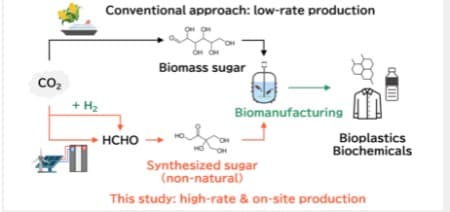With refinement of this technology, one can envision a future society in which the sugar required for biomanufacturing can be obtained ‘anytime, anywhere, and at high rate’. In the future, biomanufacturing using chemically synthesized sugar is expected to be a game changer in the biotechnology field – including the production of biochemicals, biofuels, and food, where sugar is an essential raw material – ultimately leading to the creation of a new bio-industry.
In a study recently published in ChemBioChem, researchers from Osaka University and collaborating partners developed an innovative biomanufacturing technology using chemically synthesized non-natural sugars as a raw material to solve the above-mentioned problem.
Biomanufacturing using biomass sugars such as corn obtained from agriculture is attracting attention as an environmentally friendly technology. However, the supply of such conventional biomass sugars is limited in relation to the huge demand for the production of fuels and chemical products, leading to concerns about competition with food due to the expansion of industrial use.

Comparing high rate synthetic vs slow natural sugar production for biomanufacturing. Image Credit: Osaka University. Click the press release for the original graphic image.
The process
Using bacteria (Corynebacterium glutamicum, C. glutamicum), they succeeded in fermentation production of lactate using chemically synthesized sugar solutions as the sole substrate.
This is the world’s first case in which biomanufacturing was conducted using synthesized sugar as a raw material. This achievement will enable the procurement of sustainable raw sugar that does not compete with food and is expected to further expand biomanufacturing.
Since the Industrial Revolution, climate change caused by the excessive use of fossil fuels and the resulting greenhouse gas (GHG) emissions is a global challenge of the 21st century.
Biomanufacturing is seen as one effective means of solving these issues, and its implementation is being actively promoted.
The production of the main raw material (1st generation biomass) in current biomanufacturing relies on agricultural processes such as corn cultivation.
However, there is concern that the supply of 1st generation biomass may compete with food, as it cannot satisfy the enormous demand for the production of fuels and chemical products. Furthermore, the production of sugar through large-scale agriculture has negative aspects such as land use, massive consumption of depletable resources such as fresh water, nitrogen, and phosphorus, water pollution due to eutrophication, and loss of biodiversity.
The research group has been conducting research on chemically synthesized sugar that does not depend on agriculture and the application of the obtained sugar to bioprocesses.
Chemical sugar synthesis has many advantages such as (1) an extremely high rate of synthesis (at least several hundred times faster than agricultural processes), (2) less use of water (about 1/1300 of agricultural processes), (3) less use of land (about 1/600 of agricultural processes), and (4) no need for nutrients such as phosphorus and nitrogen.
However, chemically synthesized sugars are mixtures that contain many compounds with structures that do not exist in nature.
Therefore, there have been challenges in using synthesized non-natural sugar solutions for bioprocesses, such as the presence of factors that inhibit the growth of bacteria.
In this study, the research group established a stable cultivation method using chemically synthesized sugar as a substrate, using C. glutamicum as a model bacterium.
They also identified growth inhibitory factors in the synthesized sugar solution and showed that they can be removed by secondary catalytic treatment.
Furthermore, by conducting fermentation under oxygen-limited conditions, they succeeded in the fermentation production of lactate using a synthesized sugar solution as the sole substrate despite their absence in nature.
This is the first case in history where bioproduction was conducted using agriculturally-independent synthesized sugar as a substrate.
Lactate is produced via pyruvate, which is located at the end of a metabolic pathway called glycolysis. That means that this method can be widely and generally applied to biomanufacturing via glycolysis.
The results of this research have demonstrated that chemically synthesized sugar can be used as a new raw material for biomanufacturing. The use of chemically synthesized sugar, which can be produced at high rate and on-site, is expected to solve the problems of raw material supply in biomanufacturing, such as competition with food, regional dependence, and large-scale use of depletable resources, and is expected to be a game changer in this area.
**
This leads to a couple real basic questions. Just how is chemically synthesized sugar made and just what raw materials are required? Has anyone asked or thought how to come up with those chemicals and what amount of energy is required to get to a useful end product? Building sugar molecules isn’t going to be free.
This effort has to compete with biology. With the synthesized paranoia of climate change as a driver many folks can be mislead. Biosugar is mighty clean – it soaks up a lot of carbon dioxide. Chemically synthesized sugar is going to need a bunch of carbon in some form or other too. Its hardly a carbon free or reduced carbon idea. Plus there’s a hydrogen matter to be solved.
Chemically synthesizing sugar might not be so hard. But feeding the factory might be.
We’ll have to keep and eye on this.
By Brian Westenhaus via New Energy and Fuel
More Top Reads From Oilprice.com:
- Chesapeake's Production Cut Shakes Up Natural Gas Markets
- The U.S. Finally Started to Crack Down on Crypto Emissions in 2023
- The Race for Natural Hydrogen Is Heating Up


















